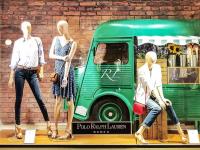 Add My Company
Add My Company
Sign In

How to Use Retail Display Props to Draw Customers
As the festive season is slowly approaching, retailers turn their thoughts to boosting their sales. It is, therefore, important to talk about how visual merchandising can increase per square foot traffic by making the store look more attractive.
Display props have an important role in visual merchandising, as they can make your retail store look more appealing to the customers. It means that they may stay longer and purchase more products. As with most marketing strategies, it’s important to know how to use display props to gain the most benefit.
You can ask your customers
Asking your customers what they’d like to see in-store is a great place to start when looking for new ways to enhance their shopping experience. It can also help you determine whether certain display elements are practical, or if you’re simply chasing trends.
For example, pop-up shops were all over social media last year, but retail experts say they may not be quite as effective as they seem. If you want to give your customers an unparalleled experience, it might be worthwhile considering some of their inputs.
Understand your target audience
Retail props come in different shapes, sizes, and colours. Some of them are merely decorative, why others are functional. However, you need to ensure that your store display resonates with your customer persona. For example, if you’re targeting younger customers—let’s say, those between 18 and 25 years old—you may want to emphasise energy and playfulness with pop music and cartoonish displays.
If you’re aiming for an older demographic (45-plus), consider a classier approach. You can think of melodic tunes and muted colour shades, for example. Paying attention to the demographics and psychographics of your target audience is vital. This can help you ensure that your displays will grab more than just a customer’s attention—they’ll also grab their interest!
Choose your props in line with your brand personality
Regardless of your industry, you need to make sure that your display props communicate the same brand message as all other aspects of your marketing communication. In other words, your store display needs to convey your brand essence.
Not only this, but your props need to match the product category your store is offering. For example, if you’re selling luxury watches at a high-end department store, it probably wouldn’t make sense to display designer handbags alongside them (unless they were part of a collection). On another note, some displays can be used for both practical and aesthetic purposes. When choosing your props, don’t forget about function—in addition to the visual appeal. One way or another, these items will help attract potential customers and highlight your brand image.
Catch customer attention with strategic visual merchandising
When using visual merchandising, you need to find the right balance to be obvious, yet subtle. It’s important not to overwhelm customers with tons of visual noise. If there is too much stuff everywhere, shoppers don’t know what they should focus on first. It can result in so-called shopper fatigue. The same rules apply to store and window displays. They should catch your eye, but they shouldn’t take over.
To successfully use retail display props for maximum impact, place them strategically within your space, so they catch attention without overwhelming it.
Some of our favourite retail props
We at Spur Creative have sculpted various retail props over the years. It's difficult to choose one single favourite, but we definitely loved making the giant lollipops and balloons for Ralph Lauren's window display. Some other very much loved examples include the giant macarons and gold stilettos we have created for Value Retail. You can see that both of these brands managed to adjust their visual displays to their brand image and the characteristics of their target audience.
For more information on How to Use Retail Display Props to Draw Customers talk to Spur Creative Group
Enquire Now
List your company on FindTheNeedle.

